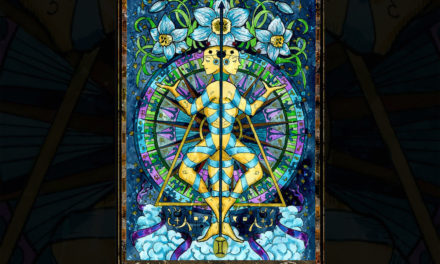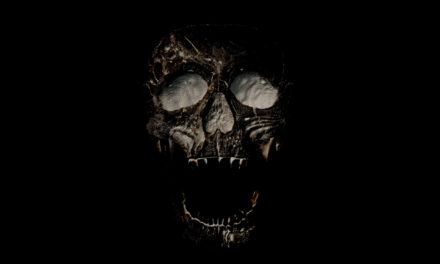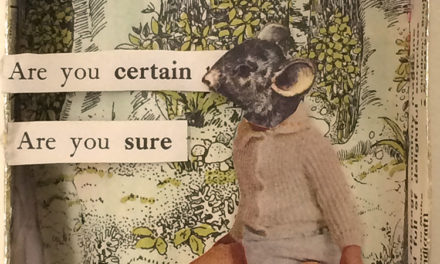Clear as Water, Red as Ruin
by Sigrid Marianne Gayangos
Issue 14: Megacity | 3,946 words

Yokohama City Library, illustration from Japanese Fireworks Catalogs
Ava had first smelled the rain before any of her other senses registered the information. She inhaled a greedy lungful of that musky, earthy scent as the first fat drops of monsoon rain fell onto the dry pavement. Then she heard it: thrumming on the roof, pitter-pattering, pelting against the window. How different this was from the rain she had experienced before, when they did not live in a concrete house with a tiled roof for the rain to drum on. Back then, an impending rain meant unbearable stench that permeated from the open dump site situated across from their former residence. Now the rain brought nothing but the loveliest fragrance. Petrichor, that’s the name.
Sometimes Ava forgot that she no longer had sole ownership of her thoughts.
I learned before, the voice continued. Plant and bacterial oils interact with geosmin. Geosmin, chemical compound released when raining. I know. It is known.
Ava’s co-body had this thing of knowing a lot of things and nothing at the same time.
Walk to beach? Watch people swim while rain? Feel rain on skin? Maybe tiangge after?
Ava sighed. The day had just started and her co-body already had a laundry list of things it wanted to do. But she never complained. After all, thanks to this co-body, they had been transferred from that garbage dump in Candau-ay to a posh townhouse within the city’s commercial district, the part of the city where only expats could really afford the rental prices.
“Okay, but let’s have breakfast here first. It makes Mama sad when I don’t eat what she cooks.”
A brief silence ensued, as if the co-body was computing the complexities of its host’s request. I understand, it said after a few seconds.
Ava’s co-body made a breathy, wheezy noise at the sight of the spread on the table. An indication, Ava knew, that it was excited and wanted to name everything it saw. Danggit, sinangag… It trailed off, having familiarized itself with the salted, sun-dried fish filleted in half and the garlic fried rice but not with what seemed like a haphazardly tossed red-and-white salad. Inspect.
“Morning, Mama.” Ava pointed at the ensaladang labanos. “That excited our guest over here.”
Ava’s mother beamed at her daughter and looked at her squarely in the eye, as if looking for the unseen co-body there. She scooped a spoonful of the appetizer and set it on her daughter’s plate. “Ma’am/Sir, this is ensaladang labanos. Very healthy and very yummy. It’s just radish, onions, and tomatoes mixed with vinegar, sugar, salt, and pepper. Here, try some.”
Ava wrinkled her nose, not a big fan of the dish herself, but she took hungry mouthfuls anyway to satisfy her co-body. White part, daikon in Japan. Meaning big root. This was news to Ava. Not only the Japanese translation, which she really didn’t care for, but also that there were hosts in Japan as well. She asked casually, “Are there many hosts in Japan, too?”
A few in Furano. But not busy places like Tokyo. As if catching itself divulging too much information, the co-body withdrew from the conversation, anchoring instead to the meal in front of them. Danggit, sinangag, ensaladang labanos, it repeated to itself.
Ava’s mother sat across and helped herself to the remaining salad. She stared at her daughter. Exactly eight months had passed, and she still had not gotten used to the changes in Ava’s body. There weren’t that many, just the neat incision on Ava’s nape and the now dull gray color of her eyes. They used to be the deepest brown, the color of damp tree bark. After the fusing process, her eyes turned to a washed-out gray, as if all the color had been sucked out of them. It was a common side effect of the procedure. To spot a host, one need only look into their eyes, gray as old galvanized shackles, with every detail of the iris bright and vivid.
“What’s your schedule like today, anak?”
“Not much really,” Ava replied while chewing. “Just a video meeting with the American doctor at midnight, Philippine time. Chinese scientists won’t arrive until day after tomorrow.” Ava stopped herself from adding how tedious it was going to be, with men in coats studying her closely as if she were a lab specimen. She knew her mother would respond to her complaints with an equally tedious lecture on how being a host was a blessing and how, in being one, she brought honor to the country and their family. So Ava decided to keep her mouth shut and carried on with breakfast.
“Well, it’s downpour season again. I assume your co-body would want to go out in the rain?”
Ava rolled her eyes while her co-body was already cooing and gushing in excitement. Yes, yes, yes! Out now. Feel rain. Please. Ava could only smirk at its sudden show of politeness.
Ava’s mother took out a huge tray of beef shanks from the freezer, making sure her daughter saw what was in store for them for lunch. “I’ll start slow cooking this now. Your favorite hearty stew is really perfect after getting soaked in the rain, yes?”
Ava sighed but immediately changed into her dri-fit shirt that she wore whenever her co-body wanted to go out in the rain. All this pleasing and accommodating of the co-body infuriated her, so she might as well enjoy the little bribery that came with it. Her mood changed the moment she stepped out of their house, however. Ava loved the overcast shadows, the washing off of the caked dry summer dust, the wet earth giving rise to new fauna and flora. There was something almost quixotic about how the rain washed away the old and made way for the new. But whatever tranquility she felt was brief, pulling away from her once she noticed the two security agents trailing behind. The agents had stopped all attempts at subtlety and groaned audibly while huddled under a tiny umbrella.
They walked down the length of Rovira Road, past the sari-sari store with the water refilling station, superfluous backpacker inns and hotels, makeshift fish stalls, and old houses. Ava smiled at the thought that not so long ago, she wished for nothing more than to live in a place like this. She never imagined her wish would become a reality in this way, but how could she complain? Ava took a left after passing the dilapidated former GSIS building. As soon as she set foot on sandy ground, Ava could feel her co-body gasping in excitement.
Spear fisher! Look!
It wasn’t the first time they had seen someone spearfishing, but the co-body’s enthusiasm for the sight hadn’t diminished. Ava spotted another teen, perhaps just a couple of years older than her, being followed by another two security agents. She was certain that if the boy turned to face her, his eyes would be the same washed-out gray as hers. Ava watched as the boy just stood there, right where the roaring waves lashed at the sandy shore, and was thankful that her co-body never demanded this kind of experience.
I don’t enjoy it. Gives me motion sickness, the waves.
“But you insist on going to Silliman Beach almost every day,” Ava said out loud.
Ava’s co-body paused, unsure how to translate the science that governed their kind; lifeforms that existed beyond human detection functioned outside of human understanding. How does one make an Earth-bound creature understand this?
I like the color.
The co-body had decided on something they would both understand. The blinding blue of the sea made a cosmic, primal scene. That two diametrically opposite lives could behold such a blue was remarkable. Ava stood before the lapping waves and felt, for a moment, so sure and so aware of her foothold.
“Indulge me. Why are there so many of you in Dumaguete?” Ava asked nonchalantly.
Compatibility.
The co-body did not elaborate, so Ava prodded. “Around how many of you here?”
Forty-seven.
“And the number continues to grow, huh?”
You are gentle people. You love visitors.
Ava couldn’t argue with that fact, though it sounded more like an accusation really. Her country loved visitors so much, treating them like first-class citizens. She sighed and allowed the calm view to soothe her. The sea faded onto the shore in gentle waves, under a bright azure sky devoid of any lingering clouds. It was as though the heavens glared at them after a watery tantrum. Birds soared, hovering on the warm wind; their cries mingled with the calm shushing of sand. Ava brooded on her co-body’s offhanded response. Was the natural subservience of her country’s people enough justification to have their bodies invaded? And what of this subservience was ever natural, rather than a by-product of something more insidious?
…likes red. Terrifying, it is.
Ava’s attention anchored back to her co-body.
“What is terrifying?”
A rider who likes red. I like blue. That one likes red.
“And you learned this other rider’s favorite color… How?”
Ava felt her co-body do whatever their version of a shrug was. We share consciousness. Same reason why we can do this. Travel across planetary systems. It’s simple, really.
The co-body slid into alien tech gibberish, and Ava could only identify but a few details, like how her co-body’s people could manipulate the space-time network at the Planck scale and set up appropriate distortions, do some black hole engineering. Ava was mindful to remember key phrases for when the Chinese or American Physicists interview her again.
Ava felt her co-body chuckle. It was definitely aware when Ava chose to focus on certain details that would give the humans a better understanding of its civilization. Like a pet owner indulging a dog in a game of fetch, the co-body allowed the humans to think that they were winning something.
The rain had already tapered off and, before she knew it, Ava found herself hailing a tricycle. This action marked a progress in their symbiotic relationship; Ava had anticipated a request from the co-body.
More synchronized now, you and I.
Ava was silent for the rest of the trip to the tiangge, still reeling from her almost automatic signaling for a vehicle. Where did her co-body’s thoughts end and hers begin? Was this what the future had in store for her—her needs and wants secondary to the whims of this unseen life force that used her as a vessel? What would happen then when this alien got bored and decided it’d had enough sightseeing and thrill-seeking in Ava’s body?
They drove past the university, which overlooked the wharf and boulevard; it was best known for being the first Protestant and American university established in Asia. The metal bust of one of its founders who had never set foot on Philippine soil was displayed boldly near its gates. Ava thought of the day when this all began, when elongated egg-like spacecraft appeared out of nowhere, hanging ominously aboveground, surrounded by mist. While these mysterious floating dark masses were the talk of the town and the world for some time, Ava lost interest in them after a few weeks. She was thankful nonetheless for the foot traffic the spacecraft had generated at the spot where she usually sold her hand-carved souvenirs.
Days, not weeks!
Ava snapped out of her reverie. “What do you mean?”
Measure of time shorter. You stopped caring we appeared days after. Not weeks.
But what was it to her, really? People had been discussing the spacecraft nonstop: religious sects chimed in with their doomsday interpretations, researchers and those in the military and government scrambled to lead sessions at the newly formed International Coalition for First Contact, journalists from across the globe aired nonstop updates or—particularly for those from the US—appeared on talk shows to express bewilderment at how something so big did not happen in cities like New York. Some locals were terrified and stayed indoors; others, like Ava, took advantage of the huge influx of visitors pouring into their seaside town. Ava started carving souvenir keychains designed after the floating eggs and sold them at twice her usual price. Money was good, but having lived her entire life in a tourism-dependent city, Ava knew that this would not always be the case. So she busied herself with selling as many souvenirs as possible while she could. Ava thought that would be the extent of her relationship with the spacecraft.
••••
Ava had been tidying up her little makeshift store at the boulevard, calling it a day after having sold her entire stock. She was waiting for her mother, who was then doing laundry services at a nearby hostel, when men in camouflage uniform, guns casually draped on their sides, suddenly approached her. One of the men, an impish grin spread on his face, turned a video camera in her direction. “Are you sure this is the one?” he asked his colleagues in an accent Ava could not quite place.
“Aveline Chriselle Dayot?”
Ava could not help but cringe at the sound of her complete name. She had always hated it. Ava found herself nodding anyway.
And then it happened in a flash—the men surrounded her, and a military pickup truck appeared on the sidewalk. Ava’s mother scampered from across the street to get to her screeching and kicking daughter. The tourist crowd stood by idly.
“Wala koy sala!” Ava shouted. “I didn’t do anything! I have a selling permit!”
The last statement was a bluff, but Ava was determined to say anything to get herself out of what was clearly a case of mistaken identity; the military intelligence in her country were anything but intelligent. Ava screamed and fought with all her might to untangle herself from the brutes who were holding her down. Only when her mother had arrived, panting and sweating, did Ava calm down.
“Your daughter has been chosen to be a special envoy for the Extraterrestrial Hospitality Committee.” The man pointed vaguely at the egg-like spacecraft above them. “She will be in good hands. We will get in touch with you soon.”
And that was all the information Ava had received about her case—the rest was a blur, as she drifted in and out of consciousness. She remembered blinding lights, white square panels on a ceiling, people in hazmat suits, people in scrubs, then waking up to a piercing migraine as a cacophony of voices reverberated in her head. She remembered seeing her mother’s worried face on a screen, but the throbbing pain in her skull had rendered her speechless. Several people went in and out of her room; some watched as nurses gave her a bed bath; some came and injected fluids into her body to help her cope with the pain. When she had recovered and the headaches had eased—or when she had learned how to live with them—when, finally, Ava was strong enough to walk unassisted to the bathroom, she looked into the mirror only to shiver. Eyes that were not hers stared back.
••••
Ava’s hand went straight to her nape and lightly brushed the incision there, a habit she had developed whenever images of the fusing procedure invaded her thoughts. The tricycle pulled up in front of the painitan food stalls, right at the entrance of the tiangge. Ava handed a crumpled 100-peso bill to the driver, ten times the usual fare.
“Daghang salamat, mamser!” The driver thanked them profusely, his eyes looking straight into Ava’s gray ones, as though addressing the co-body directly.
“Ako man na nihatag, dili siya.” Ava stated matter-of-factly that the generous payment had nothing to do with the invisible rider. “This thing wouldn’t know the difference if I handed you a ten or a hundred. But I suppose it’s all thanks to him I have that kind of money.”
Ava plowed through the sea of market goers, pausing only when her co-body wanted to examine something that had caught its fancy. Taste roasted peanuts. Touch ukay-ukay clothes. Smell sikwate. Taste sikwate. Walk slower. Inspect closely. She stopped paying attention to everything else after a while, just following the steady stream of command, ignoring the stares and whispers. The crowd parted for her, though not as energetically as they had a year and a half ago.
They shouldn’t be selling those.
Ava found herself scanning a display of parrotfish from one of the fish stalls: bucktoothed, bright blue with patches of yellow. Ava knew that this was more than her co-body’s affinity to the color blue. This creature, she knew, spent most of its life eating algae off reefs, helping corals grow and thrive. Her co-body seemed to have an encyclopedia-like knowledge of anything that had to do with water, bodies of water, and the creatures that dwelled in them. But did it also understand hunger and desperation? Did it understand locals had to fish and sell these just to have food on the table?
“Punish them then.” A disembodied voice said from behind them.
Ava turned and found herself face-to-face with a boy with the same cold gray eyes as her. Ava’s co-body remained in tensed silence, sensing deep animosity from this other co-body.
Two sets of bodyguards appeared next to the hosts. But the boy remained unfazed and casually took out a concealed spear gun.
“I think it’s only fair for you to feel what this fish felt.” The boy addressed the fish vendor coolly. “Don’t you think so?”
The fish vendor did not say a word, did not move a muscle.
The boy sneered and started poking the vendor’s forearm with the pointy end of the gun. “Forgive me, but my co-body insists on seeing a crimson trickle down your arm. I’m left with no choice.”
Then came the most piercing shriek Ava had ever heard, an ear-splitting howl of pain, followed by a wild murmuring from the onlookers. But no one did anything to stop the boy from puncturing the fish vendor with the spear gun. Ava wanted to do something, but it seemed that she was frozen in place, and all she could hear was her co-body’s incessant whispering that this was the one who liked red so much. The vendor’s cries of anguish cut through the whole tiangge, his left arm now a shaking fountain of deep red blood that he clutched close to his chest.
One of the bodyguards crouched to the injured man and told him that help was on the way. They seemed accustomed to defusing emergencies. The boy proceeded to wipe the blood off his speargun with an air of indifference and declared that he was simply following orders.
Please, Ava, get out of here.
Ava couldn’t agree more. She pushed her way out of the growing crowd, away from the mass of panicked voices. She half-walked, half-ran until she was out in the main thoroughfares once more. Struggling to contain her labored breathing, paying no heed to where her legs took her, Ava found herself scurrying outside the imposing gates of Saint Catherine of Alexandria Cathedral. On its far left, one of the remaining coral-bricked campanarios that served as a watch tower for raiding pirates in the 1800s stood, besieged by the ghosts of the past. Ava chuckled wryly at the fate of her people.
Their old gods and goddesses were vilified to make way for the new god, the true god, the god that white people brought with them. The god that required them to pay tribute by toiling their own land for others’ profit. Yet her people’s old customs had not completely perished; they persisted within the new practices—words from the old tongue mimicked Latin and appeared as chants in religious pamphlets, animist rituals morphed with Catholic practices, images of the old gods hid behind porcelain sculptures of saints. With these new colonizers, who came promising the salvation of their minds and not just souls, her people had to employ the same invisible methods of resistance to preserve who they were.
Ava seethed at the thought of not being able to overtly show defiance. She hated how she had just stood, rendered completely immobile by fear, as the boy who seemed so sweet and gentle pierced the poor fish vendor with a speargun, all because their new alien overlords had ordered him to. It was the same cycle of conquest again; they were pitted against each other only to be passed on from one master to another. Ava wondered how much more subjugation they would be able to handle until their already fragmented selves would dissipate, then disappear completely.
Ava…AVA!
It was the first time Ava’s co-body addressed her by name. She cleared her head and allowed for their chain of thoughts to intertwine once more. Ava was surprised how it had become almost intuitive, the uncoiling and recoiling of consciousness. She sensed unease in her co-body with this recent progress. Perhaps these seemingly advanced creatures from outer space were not as superior as previously perceived. Why else would they rely so much on human bodies just to vicariously experience mundane things? But Ava knew better than to interrogate her co-body about that now.
“Sorry, I was trying to catch my breath. What is it?”
There was…Nothing. Saw nothing. Heard nothing.
Ava had an inkling about what had happened but decided to feign innocence anyway. “I don’t get it. We’re here,” Ava gestured at the hubbub of activity around them. “Surely, this isn’t nothing?”
For few seconds nothing. Blank. Dark. Like submerged in the deep and cannot shout.
“But you called my name! You’ve known my name all along. Why have you never used it until now?” Ava teased.
Aveline Chriselle Dayot name. Ava nickname.
Ava laughed heartily at her co-body’s attempt at humor, relieved that it quipped about her name instead of questioning the darkness it had just experienced.
“Is it true what he said?” Ava demanded.
Silence.
She knew that her co-body understood what she was asking: Had the boy’s co-body really insisted on committing such a violent act? Ava made sure that their consciousnesses were firmly linked when she asked.
Not all riders. Only some.
There was that characteristic deflection once more. Ava said nothing in reply. Well, two can play the game. If her co-body left her in the dark, it was only fair that it wouldn’t have complete access to her thoughts. So she pushed away her thoughts, inundating her brain instead with the most inconsequential things. She concentrated on images of the blinding blue sea, the sweet-sour taste of ensaladang labanos, and the feel of rain as goose pimples covered her arms—all the little things that her co-body took delight in.
Ava mustered her sweetest and most carefree tone. “It’s almost noon already. What say you we head home now? I’m dying to slurp a bowlful of Mama’s bulalo.”
Agreed.
Ava forced herself to put one foot in front of the other, doing her best to seem composed despite her racing heart. She knew the best way to extract information out of her co-body. But she shrugged the thoughts out of her consciousness even before they could turn into a coherent plan. A car slowed down before Ava, waiting for her to cross the street. She caught a glimpse of herself on the tinted windshield, and blood coursed through her veins as the reflected image revealed the true color of her eyes. Deep, dark brown. And so she walked calmly down the sidewalk, through the dense Dumaguete crowd, unheeding the bodyguards who continued to tail her. People parted hurriedly before her in fear. But, this time, Ava herself was no longer afraid.

Sigrid Marianne Gayangos
Sigrid Marianne Gayangos is the author of Laut a collection of short stories published by the UP Press, and Lola Maria’s Candles, a forthcoming bilingual children’s book from Aklat Alamid. She is currently self-translating her Chavacano collection, El Vida Encantao (The Enchanted Life), to English and hopes to publish it soon.




